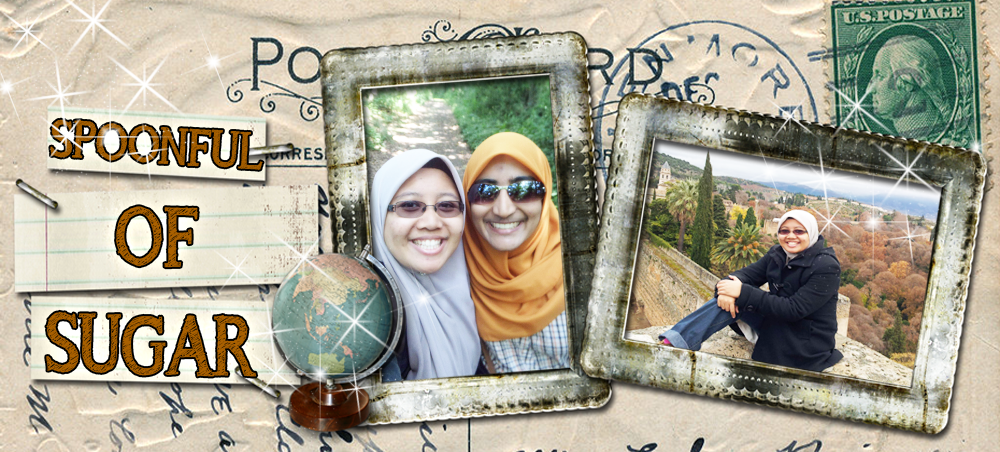Salam and good day readers!
First and foremost, let me take this opportunity to wish Eid Mubarak to all Muslim all over the world!!
This is the first time I spent eid away from my family. Spending eid abroad, let alone in a non-muslim country is a new and exciting experience.
Eventhough it has passed the 1st day of eid, I would like to share some etiquettes as thought by our beloved prophet Muhammad (صلى الله عليه و سلم) during the day, may we gain some knowledge and blessing. It can still be applied on next year insyaAllah. ;-)
1) The early morning starts with a morning shower (ghusl) with a specific niat:
نويت الغسل لعيد الفطر سنة لله تعلى
NAWAITUL GHUSLA LI I’DIL FITRI SUNNATALLILAHI TAA’LA
This is in conjunction with the teachings from the Prophet muhammad (صلى الله عليه و سلم):
It was narrated in a saheeh hadeeth in al-Muwatta’ and elsewhere that ‘Abd-Allaah ibn ‘Umar used to do ghusl on the day of al-Fitr before going out to the prayer-place in the morning. Al-Muwatta’ 428.
Al- Nawawi (may Allaah have mercy on him) said that the Muslims were unanimously agreed that it is mustahabb to do ghusl for Eid prayer.
2) We wore new/our best clothing for the day and prepare to go for prayer.
It was narrated that Jaabir (may Allaah be pleased with him) said: The Prophet (peace and blessings of Allaah be upon him) had a cloak which he would wear on the two Eids and on Fridays. Saheeh Ibn Khuzaymah, 1756,
Al-Bayhaqi narrated with a saheeh isnaad that Ibn ‘Umar used to wear his best clothes on Eid.
Although for women, it is not permissible to adorn oneself in front of a non-mahram (non-relative) men. So, women should not be excessive in wearing adornments to an extent where it will be considered as haram. One should always be modest in what they are wearing.
3) Before going out to pray on Eid al-Fitr, it is important to eat something because part of the etiquette is not to go out to pray on Eid al-Fitr until one has eaten some dates, based on the hadeeth narrated by al-Bukhaari from Anas ibn Maalik, who said that the Messenger of Allaah (peace and blessings of Allaah be upon him) used not to go out on the morning of Eid al-Fitr until he had eaten some dates… of which he would eat an odd number. Al-Bukhaari, 953. It is different than Eid al-Adha where we eat after the prayer.
4) Takbeer on the day of Eid is one of the greatest sunnah during Eid al-Fitri.
“(He wants that you) must complete the same number (of days), and that you must magnify Allaah [i.e. to say Takbeer (Allaahu Akbar: Allaah is the Most Great)] for having guided you so that you may be grateful to Him”
[al-Baqarah 2:185]
It was narrated that al-Waleed ibn Muslim said: I asked al-Awzaa’i and Maalik ibn Anas about saying Takbeer out loud on the two Eids. They said, Yes, ‘Abd-Allaah ibn ‘Umar used to say it out loud on the day of al-Fitr until the imam came out (to lead the prayers).
The time for takbeer on Eid al-Fitr starts from the night before Eid until the imam enters to lead the Eid prayer.
It was narrated in the Musannaf of Ibn Abi Shaybah with a saheeh isnaad from Ibn Mas’ood (may Allaah be pleased with him) that he used to recite takbeer during the days of tashreeq:
Allaahu akbar, Allaahu akbar, laa ilaaha ill-Allaah, wa Allaahu akbar, Allaah akbar, wa Lillaah il-hamd (Allaah is Most Great, Allaah is most Great, there is no god but Allaah, Allaah is Most great, Allaah is most great, and to Allaah be praise).
5) Offering congratulations and good wishes like Eid Mubarak and Taqabbalallahu minna waminkum are the good practices among muslim when they meet and greet each other.
It was narrated that Jubayr ibn Nufayr said: When the companions of the Prophet (peace and blessings of Allaah be upon him) met one another on the day of Eid, they would say to one another, “May Allaah accept (good deeds) from us and from you.” Ibn Hajar said, its isnaad is hasan. Al-Fath, 2/446.
6) Going to prayer by one route and returning by another is also among the practices thought by prophet Muhammad (صلى الله عليه و سلم).
It was narrated that Jaabir ibn ‘Abd-Allaah (may Allaah be pleased with him) said: On the day of Eid, the Prophet (peace and blessings of Allaah be upon him) used to vary his route. Narrated by al-Bukhaari, 986.
It was said that the reason for that was so that the two routes would testify for him on the Day of Resurrection, for the earth will speak on the Day of Resurrection and say what was done on it, both good and bad.
And it was said that it was in order to manifest the symbols of Islam on both routes, or to manifest the remembrance of Allaah (dhikr), or to annoy the hypocrites and Jews, and to scare them with the large number of people who were with him. And it was said that it was in order to attend to the people’s needs, to answer their questions, teach them, set an example and give charity to the needy, or to visit his relatives and uphold the ties of kinship.
Wallahua'lam. Allah knows best. May we receive His blessings.
Until next time...


No comments:
Post a Comment